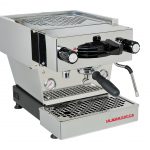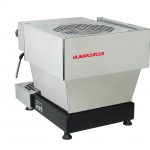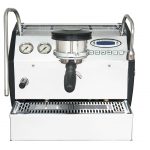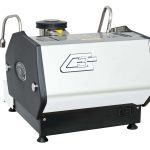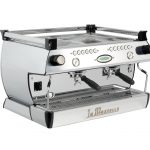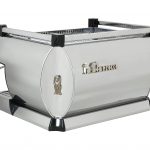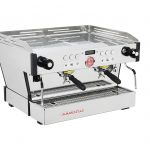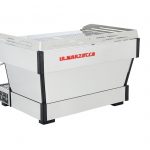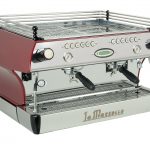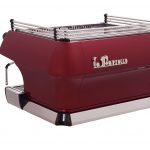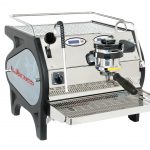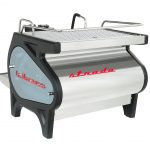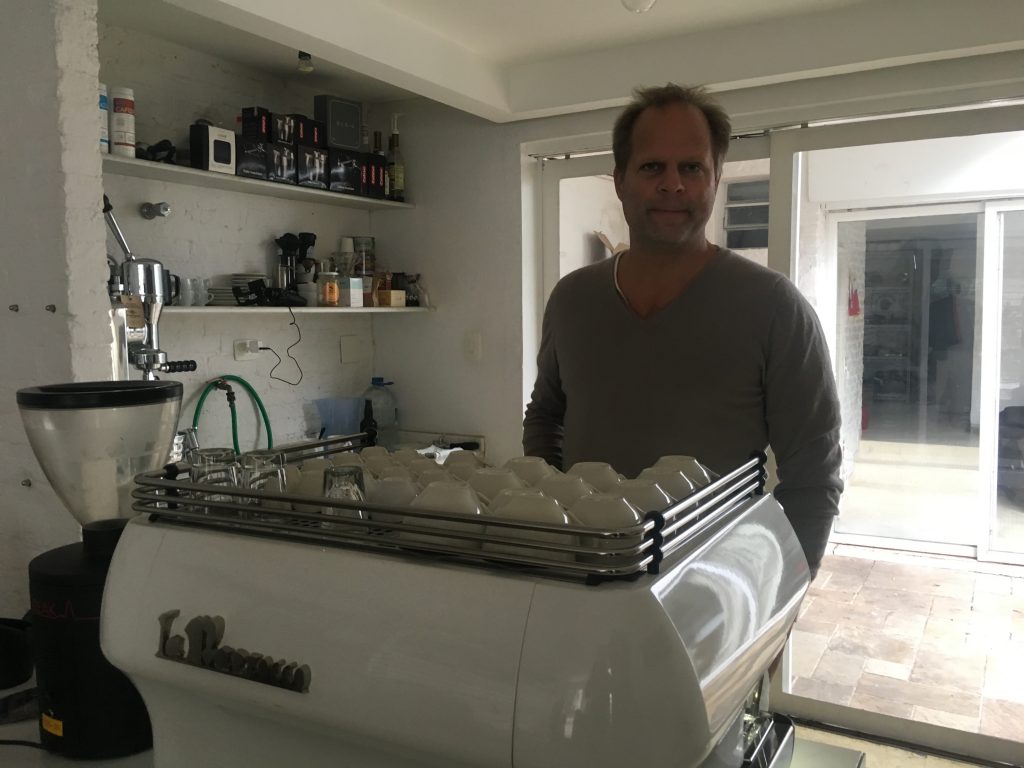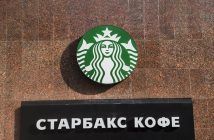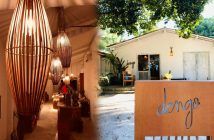All over the world, La Marzocco espresso machines are an object of desire. Completely hand-made, each machine needs an average of three to five months to be built at the factory, which is localized in the Province of Florence, a region of Italy. They are very proud of their Florentine origin, since the city was the place of birth of the period known as Renaissance.
An influence in the design of machines is no mere coincidence. The lion that protects the city, Il Marzocco, was adopted as the company logo.
Created by two brothers, Giuseppe and Bruno Bambi, in 1927, it was the first company to develop and patent – in 1939 – a espresso machine with a horizontal boiler, which was later adopted by other manufacturers.
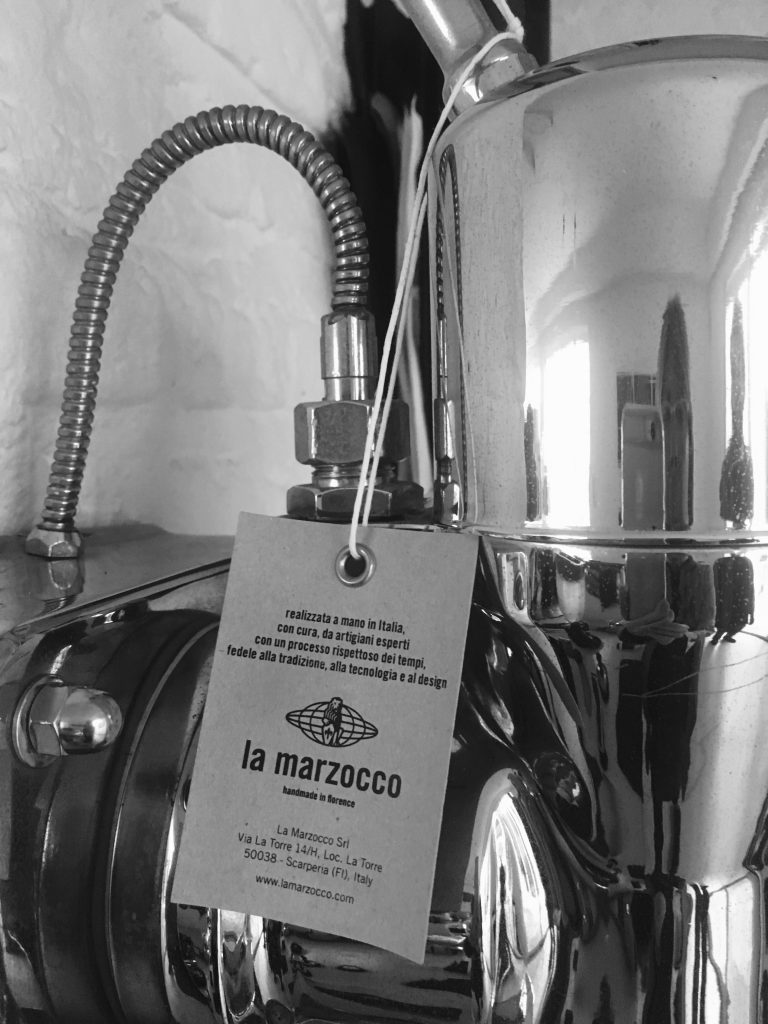
(Traditional label of La Marzocco, the most famous brand of espresso machines in the world)
Later, it included one more boiler in all its models, being, until today, the only espresso machine with two boilers. One, directed only at the water and the other at the steam.
Baristas love it. They state that it is an intelligent equipment, which offers the best conditions of coffee extraction and vaporization of the milk. Its boilers are stainless steel, 3 mm thick and each group of stainless steel components was cast directly into the boiler, forming a single piece.
All these specifications have a price, of course. Marzocco’s entry model in Brazil, in 1990, costs around R$ 41,000, it was designed for an average coffee shop. And Strada, one of the most sophisticated models, does not cost less than R$ 105,000.
Throughout the country, between 250 and 300 machines have been marketed, which is a low, really low sales number. Its main markets are the United States, Australia, New Zealand, Japan, England and Germany. “Our challenge is to take advantage of the growth in the specialty coffee market segment in Brazil, to sell more, helping to transform the sector with high quality”, explains the brand representative for Brazil, Paul Germscheid.
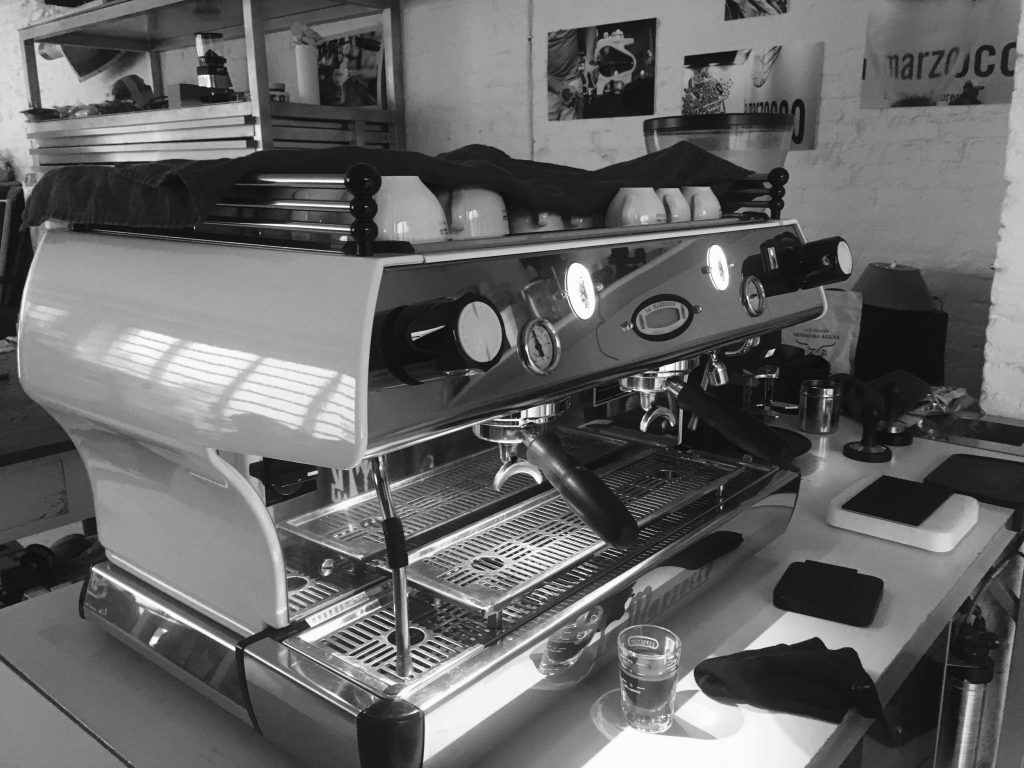
(The La Marzocco F80 model in which Paul made us an espresso)
German or Brazilian?
German by birth, Paul has lived 11 years in Brazil and coffee has always been his passion. “I have a degree in engineering in Germany. I used to work with research in microtechnology, with an emphasis on micromechanics.” But my passion for coffee made me discover an old, used Marzocco machine, which I bought to reform.
When a Brazilian friend of mine saw it, he loved it, and wanted to buy a similar machine in Brazil. I contacted the factory, which informed me that they don’t have any representatives in Brazil. So, I told them about the reform that I already had made in the machine, when they saw the result, they immediately asked me to represent the company in Brazil,” he says.
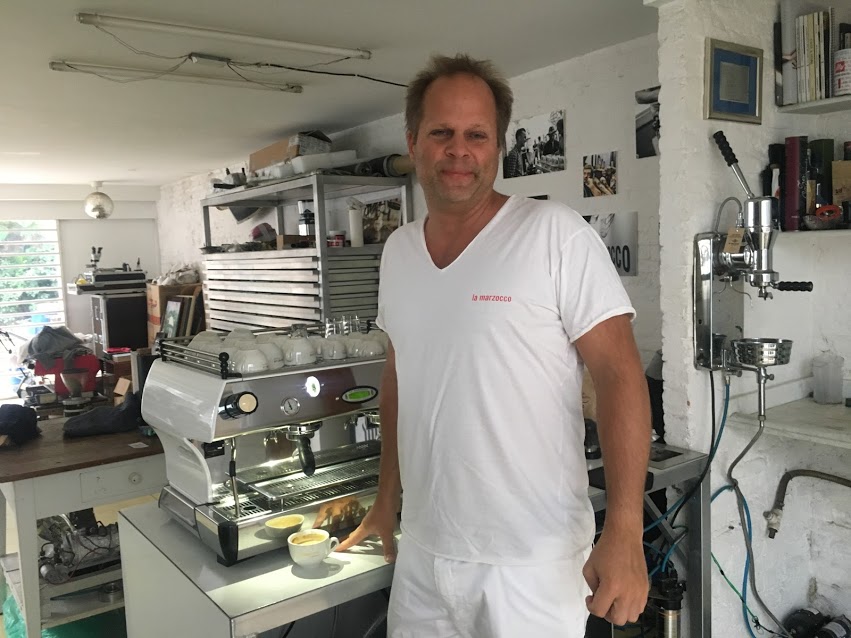
(The friendly german Paul Germscheid, La Marzocco representative in Brazil)
Paul already had a connection with our country because of his wife, a Brazilian of German family. He convinced her to return to Brazil and came to São Paulo, where their children were born. “I wanted to have this new experience due to my passion for coffee, and here was the ideal place,” he recalls. “In Brazil, we have market and coffee production, in the same place. This is very unique”, he explains.
“In Brazil, I can always visit the farms and fuel my passion for specialty coffees.” I like to travel, to search for new coffees, and when they are small producers, I help in the roasting process, always thinking of emphasizing the drink qualities. And, obviously because I need samples for fairs and show rooms, but I love knowing a whole chain”, he says.
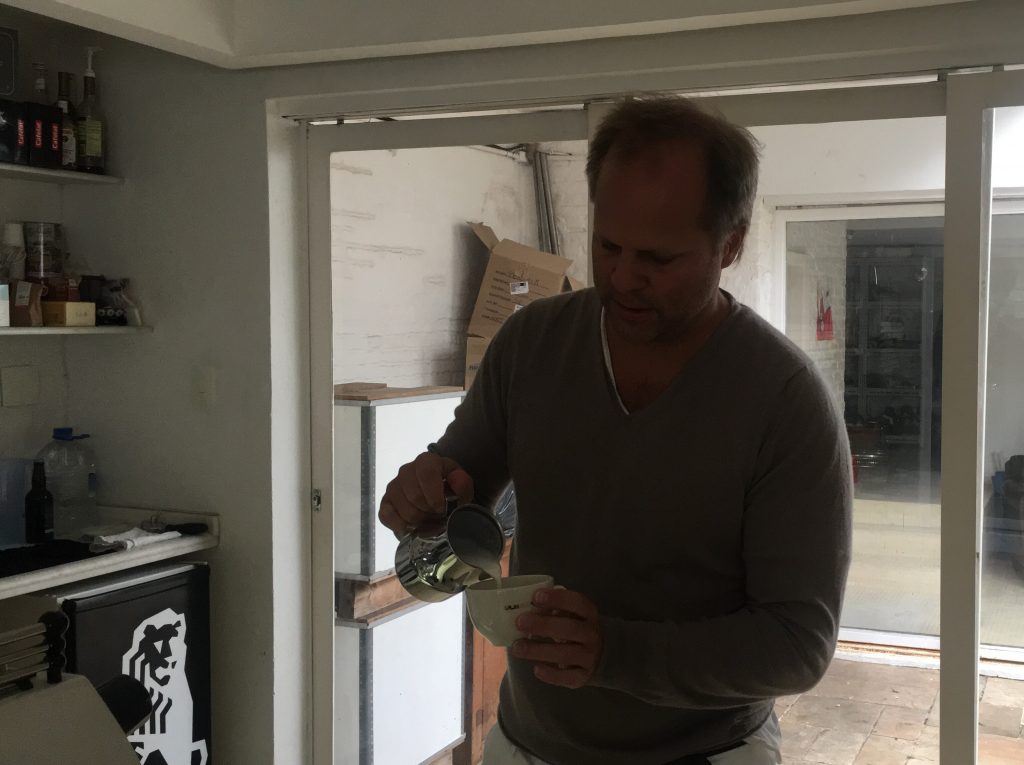
(Paul adding milk preparing the espresso he served us!)
Design even in the address
As design is present in La Marzocco’s DNA due to life coincidences, Paul ended up being situated in a house in the Jardins district, one of the most noble areas of São Paulo designed by the renowned Brazilian architect, Villanova Artigas. A real jewel: just like La Marzocco.
The interview took place in the lounge by the pool, with ample open space, which allows the sunlight to enter, one of the main features of the architect. “As soon as I moved here, I had endless parties here, me and my coffee friends, from all over the world, it felt like paradise”, he confided.
Sales and rentals
The strength of La Marzocco in Brazil is sales. “We also rent some machines, but in this specific case, I like to choose my clients for rental. It has to be someone who knows how to use and be careful with the machine. Otherwise, it is a certain loss”, he says.
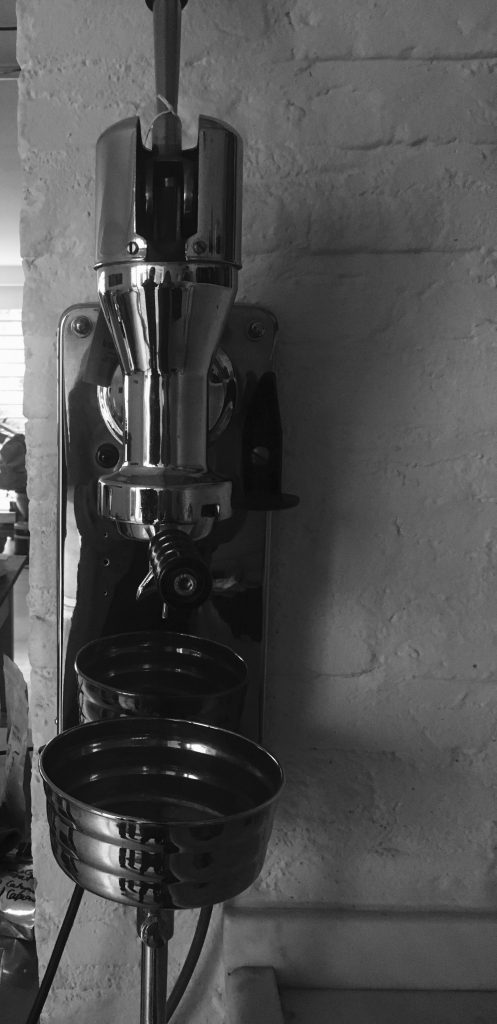
(Old La Marzocco model da La Marzocco that Paul owns at his beautiful house in São Paulo)
New model will be launched in October, at Host 2017
Currently, the following models are available: GS3, Linea Mini, F80, GB5, Linea PB and, the most sophisticated of all, Strada. “In October, at the Milan Fair, Host 2017, a new model will be launched. It is a lever machine, a modern and sophisticated interpretation of the older machines. I am already working on INMETRO certification and I estimate that it will be available for sale only in 2018 here; In Brazil”, he confides.
The creative process of a new La Marzocco machine takes about four years. “I had the privilege of following all creative steps and even helping in some solutions found”, he says proudly.
Modelos for sale in Brasil
- La Marzocco Linea Mini – R$ 26.000
- La Marzocco Linea Mini – R$ 26.000
- La Marzocco GS3 – R$ 41.000
- La Marzocco GS3 – R$ 41.000
- La Marzocco GB5 – R$ 60.000
- La Marzocco GB5 – R$ 60.000
- La Marzocco Linea PB R$69.000
- La Marzocco Linea PB R$69.000
- La Marzocco F80 – R$ 70.000
- La Marzocco F80 – R$ 70.000
- La Marzocco Strada – R$105.000
- La Marzocco Strada – R$105.000
Peculiarities of Brazil
And he continues: “Espresso machine is the heart of the business in a coffee shop. Allied to the coffee quality and the commitment of those who will work in it. Without these three factors, it is impossible to create a healthy business environment”, he says.
Here in Brazil, coffee shops usually have only one machine. Few use two of them to have a margin of safety. In Europe and the U.S. is more common, even because the daily sales volume of coffee is much higher. The average there is 10 kg per day, while here does not reach 4.5 kg.
The right time to place an order for the factory is about five months in advance. In Italy, they only work on demand, so they can produce the machine in the color the customer wants. After that, the machine takes between two and three months at the customs. The transport is fast, since they come by plane, he explains. But for those who want the machine immediately, Paul has some machines available.
First customer
(His first client in Brazil was a restaurant/cafeteria in Itaim, which is already closed, it was called Túlia. The first machine sold was also for that customer also no longer exists, the Nice Cup model.)
The Roast
His love of specialty coffees led him to the Danish coffee roast master Peter Dupont, from Coffee Collective, with whom he took a roast course. He loves the work of the Danish barista, Klaus Thomsen and, provoked by Special Grain, makes a comparison. In Brazil, when a barista succeeds, he gets better known, he wants to appear, he no longer wants to work on the machine. Being an entrepreneur is good, but you cannot quit coffee”, he emphasizes.
“People have not yet realized that roasting is something extremely important. Small specialty coffee producers do not know how to taste its product, they cannot evaluate their own coffees. Thus, the exporters end up defining the coffee price, always, of course, trying to lower the price. There is no information from the exporter on the coffee for the producer, there is no feedback. All the power is in the hands of the mega-exporters”, he predicts.
Paul also says he has a close friend, Eystein Veflingstad, working at the company 3ª Onda, who was a great roaster in Germany, also married to a Brazilian woman, came to live in Brazil because of the same passion for coffee. Today he is a coffee consultant, focused on small producers. He works a lot in the region of Caparaó, Santa Rita, Piatã, Chapada Diamantina, in the State of Bahia “He moved to Brazil because his wife was tired of the cold. Living in Salvador, he helps the small producers to improve their production and also in the roast”, he says.
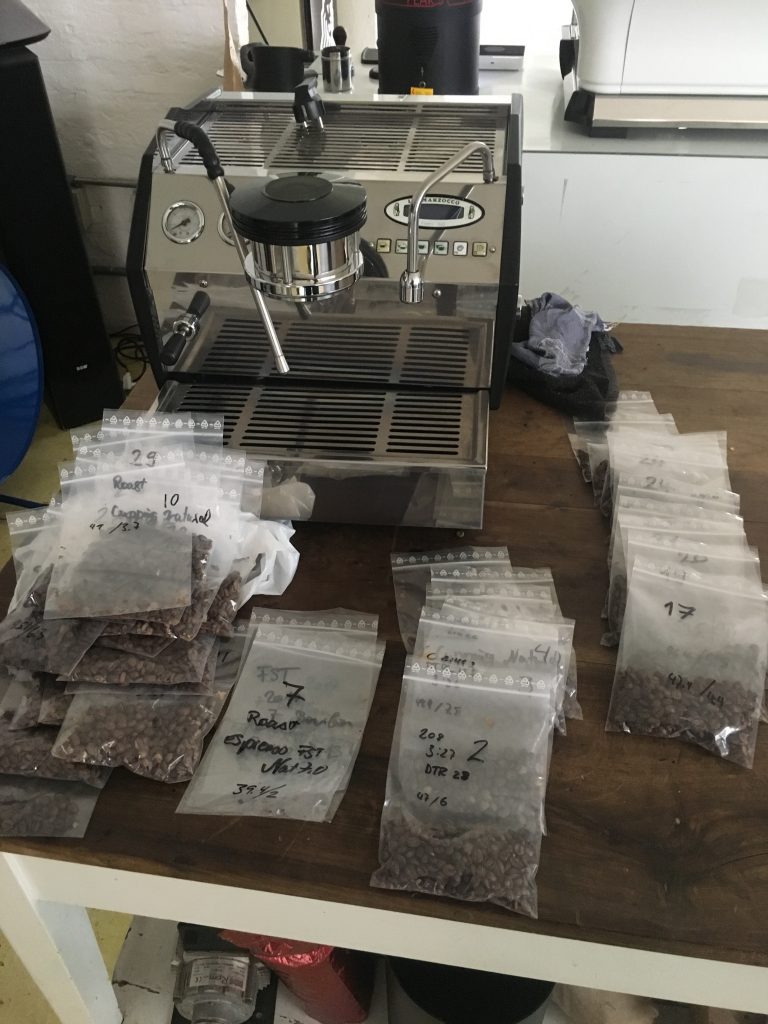
(Coffee samples from Santa Terezinha Farm that Paul tastes at his house)
The special coffee in Brazil
Paul is a fan of the special coffee scene in Curitiba, especially of the work done by Lucca Café. “I also like Brasilia, there are a lot of things going on there. Northeast is starting to wake up for the specialty coffees, we already have a customer there, in Piauí, but the specialty coffees scene in Rio de Janeiro is a disaster”, he says without hesitate.
Despite Brazil’s continental size, Paul emphasizes that La Marzocco offers technical assistance to all its customers, wherever they have business. “We take the plane and visit our clients wherever they are. Our machines hardly break, but we are always ready to help. On the day of our interview, a client from Aracaju was having some problems, and in order to solve it, Paul interrupted our interview a few times. That’s the seamy side of the job.
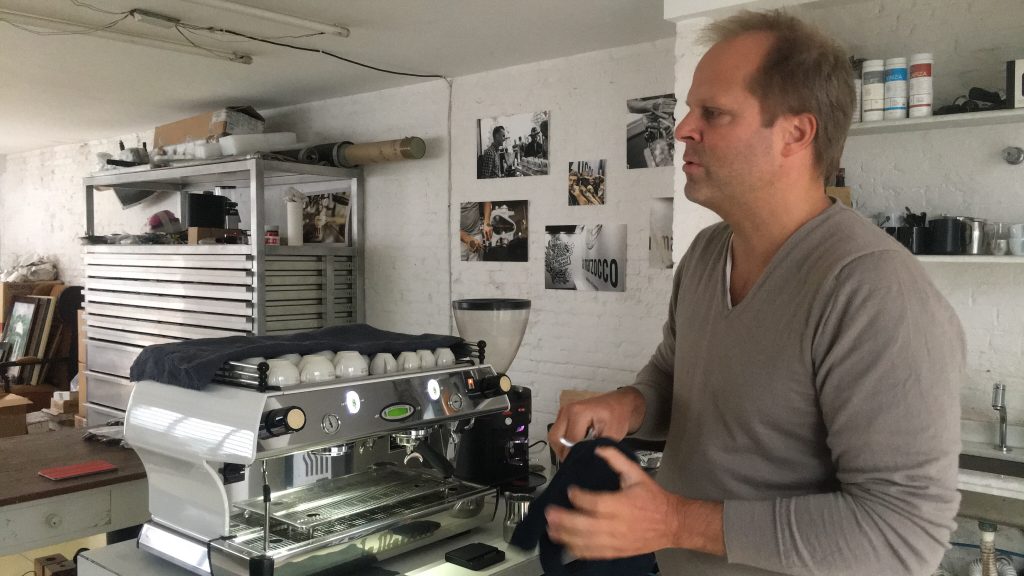
(Paul Germscheid chatting with Grão Especial’s crew)
La Marzocco Future
La Marzocco knows that its product is the dream of the whole world that understands coffee. It was the first to install the boilers horizontally and the first to work with a saturated boiler. “They are far ahead of their competitors and have always guided their work so that coffee extraction is the best possible”, says Paul.
Currently, La Marzocco has heavily invested in research and improvements in processes and materials. “They always aim to make it more noble and better. The brand’s philosophy is the opposite of the others: first they make the machine, then sum up the production costs”, he says proudly.
Soon, the renovation of the old La Marzocco factory in Florence will be completed, which will be transformed into a coffee academy aimed at educating the general public. Good news!
Ikawa
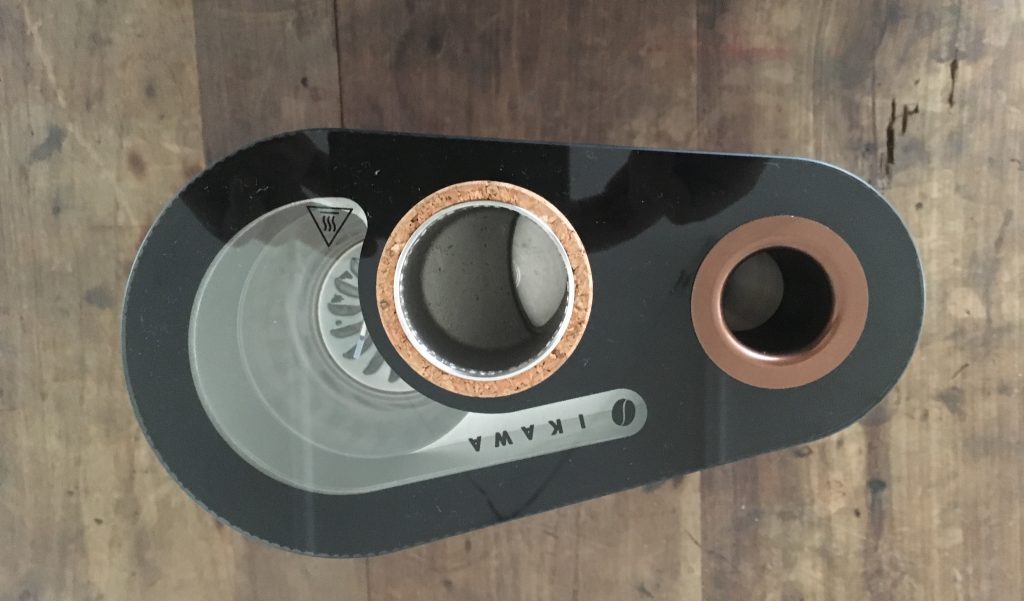
(The Ikawa roasting machine model that Paul’s going to sell)
Another news from Paul: he is bringing to Brazil for marketing, the English roaster, Ikawa, which roasts only 50 grams per operation. It is a machine with impressive precision, designed for commercial use, but it is expensive (about R$ 19,000), but with it, it is possible to accurately evaluate the coffee samples. At the moment, he is working on the INMETRO certification process.
The passion for precise machines and the special coffee brought him here. May he preserve this passion!

